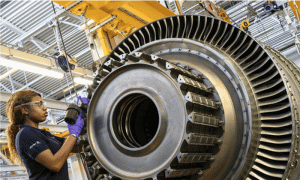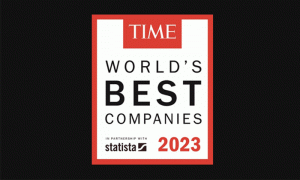National Disability Employment Awareness Month: You Are Not Alone
When the Pratt & Whitney Empower Ability Employee Resource Group launched its “Faces of Ability” poster campaign, finding employees who were willing to be featured proved to be a challenge.
Amanda Billiot, an executive champion for Empower Ability, was among those pictured on the first series of posters published in 2016. She also called on several colleagues to participate.
“It was based on people that I knew,” Billiot said, “to go out, seek them out and ask.”
What a difference five years makes. This year, so many employees volunteered for “Faces of Ability” that not all could be included in the annual campaign. This year’s “faces” represent a broad – and global – cross-section of our colleagues.
“Now we have people volunteering,” Billiot said, “and they are from every spectrum of the workforce. We’re changing the culture at Pratt where people want to share those stories.”
October is National Disability Employment Awareness Month in the United States. Empower Ability, one of the nine Employee Resource Groups at Pratt & Whitney, represents individuals who overpower a disability, their caregivers and individuals who speak up for the disability community.
“Our mission is to foster an inclusive culture by providing resources for employees with different abilities and those who are caregivers and allies through both education and awareness,” said Michele Burnat, president of Empower Ability. “This really enables a platform to advance recruiting, retention and talent development representing all abilities.”
Hear more from Pratt & Whitney employees Michele Burnat and Amanda Billiot on this episode of Pratt Chat. They’ll discuss what allyship means to Empower Ability and share their vision for a truly inclusive workplace.
EPISODE TRANSCRIPT
Rob McGuinness: The U.S. Centers for Disease Control and Prevention reports that one in four Americans live with a disability. One in four: That’s about 61 million people.
Rob McGuinness: The term “disability” covers a wide range of conditions. The CDC report measured six types, including mobility, cognition, hearing, vision, independent living and self-care. Some disabilities are more visible than others.
Rob McGuinness: One of the nine Employee Resource Groups at Pratt & Whitney is dedicated to representing individuals who overpower a disability, their caregivers, and individuals who speak up for the disability community. That group is Empower Ability.
Rob McGuinness: Their goal? It’s pretty straightforward. Here’s Michele Burnat, president of the group.
Michele Burnat: If you look at our vision statement, it’s pretty simple. It’s a workplace where everyone is different and everyone is able.
Rob McGuinness: Today we’ll hear from Michele and Amanda Billiot, one of the executive champions for Empower Ability. I’m Rob McGuinness, and you’re listening to Pratt Chat.
----
Rob McGuinness: October is National Disability Employment Awareness Month in the United States. That observance dates all the way back to 1945. This year is also the 30th anniversary of the Americans with Disabilities Act.
Rob McGuinness: Michele Burnat is the senior fellow discipline lead for Manufacturing and Industrial Engineering. She also serves as president of the Empower Ability Employee Resource Group. Amanda Billiot is vice president of Human Resources for Operations and an executive champion for Empower Ability.
Rob McGuinness: Michele, for our listeners who may not know Empower Ability, tell us about your group.
Michele Burnat: Absolutely. Our membership represents three distinct groups. Individuals that overpower a disability, their caregivers, and individuals that speak up for the disability community.
Michele Burnat: Our ERG covers the interests of a wide spectrum of visible and hidden disabilities, from physical to intellectual learning disabilities, from hearing and vision loss to memory loss, as well as mental illness to genetic and chronic illness.
Amanda Billiot: I think this is a group of people who found themselves when they found each other. You never know what other people are going through, and so many people are going through things that you will never see, or perhaps even know about. And many disabilities are invisible. We truly have a collective agenda that we’ve brought together in this group of people, and we love that.
Michele Burnat: Our mission is to foster an inclusive culture by providing resources for employees with different abilities and those who are caregivers and allies through both education and awareness. This really enables a platform to advance recruiting, retention and talent development representing all abilities.
Michele Burnat: If you look at our vision statement, it’s pretty simple. It’s a workplace where everyone is different and everyone is able.
Rob McGuinness: That’s such a clear, straightforward vision. I like that a lot.
Amanda Billiot: We’re all different AND we’re all able. That’s the beauty of it all. It’s such a simple mission statement, but it just makes it applicable to absolutely everyone.
Rob McGuinness: Everyone has a different definition of allyship, and what it means to them. I’m curious to know how allyship has helped Empower Ability. How can allies ensure that everyone’s voice is heard?
Michele Burnat: If you google “allyship,” you’ll see it means supportive association with another person or group for mutual benefit. For the past three years, we’ve quadrupled our membership, creating more allies in our Pratt & Whitney community.
Michele Burnat: A great example of community allyship was last year when we took head on the topic of mental illness. We worked with Pratt & Whitney Communications to publish multiple mysite articles on mental health, and then we took to the streets to show support by donning green ribbons. We distributed over 1,000 green ribbons in lobbies, in cafeterias and various events, that resulted in dozens upon dozens of personal stories being shared about PTSD, anxiety and depression.
Michele Burnat: We’ve also witnessed the growth of allies in our senior leadership level. I’ve been welcomed into senior staff meetings or asked to have one-on-one executive discussions, all of which have resulted in increased sensitivity and support for our disability community.
Michele Burnat: Another really perfect example of allyship is, for the first time ever at Pratt & Whitney, we had the approval to launch an autism internship program. Allies from all levels came out to help plan and sponsor a position in their area. The team benchmarked 22 companies that already had autism hiring programs so that we could adopt some of their best practices. Unfortunately, due to the current pandemic, we were not able to launch in 2020, but look forward to 2021.
Amanda Billiot: I also think that allyship is more about others than it is about yourself. It is a selfless act that can be done easily and immediately and can only improve the world around us. Anne Frank once said, “How wonderful it is that nobody need wait a single moment before starting to improve the world.” It’s so profound. And yet it is so simple. And that’s Empower Ability in a nutshell. Right? When you think about allyship, it doesn’t take a lot, but it makes a huge difference.
Rob McGuinness: It really does. You noted the example from last year about mental illness. I hosted a few episodes of Pratt Chat where we discussed that topic, and they were all very well received. Depression is something that affects me, and it has for a long time. To see the green ribbons at work, that sends a message that it’s OK. It’s reassuring. I can tell you that I personally appreciate those efforts.
Amanda Billiot: Thank you for sharing that. That takes bravery. And I’m so proud that you feel comfortable saying that and sharing that. And honestly, if you think about our journey over the last several years, part of this “heart” mission that Michele and I and the other leaders across Empower Ability have, is to really allow employees to bring their full selves to work. We talk about diversity and equity and inclusion and, you know, having a disability, having these struggles, is something that actually creates more commonality across us. It creates these connections more than anything. We have so much in common, but a lot of it we don’t see, because you don’t feel comfortable sharing the struggles or because it impacts our self-confidence. We want folks to be able to bring their whole selves to work, no matter what that self looks like, and have them be accepted.
Rob McGuinness: Let’s talk about what an inclusive workplace means to you. And how our colleagues can help support inclusion. Michele, what are your thoughts there?
Michele Burnat: It is symbolic that 2020 is the 30th anniversary of the Americans with Disabilities Act, or ADA. In 1990, the ADA was signed into law, that prohibited discrimination against individuals with disabilities in all areas of public life, including jobs, schools, transportation and all public and private places open to the general public.
Michele Burnat: Unfortunately, persons with disabilities are strikingly still under-employed. A report published by Accenture in 2018 depicted that only 29% of Americans of working age with disabilities were in the workforce, versus 75% without a disability.
Michele Burnat: To me, an inclusive workplace further leverages the talent pool of 10.7 million Americans with disabilities. In addition, recruiting and hiring practices are modified so that an individual, say, on the autistic spectrum, has an equal chance of being hired into a role. Also, workplace, office and shop design is conducive for individuals with disabilities.
Michele Burnat: These types of inclusive actions would lead to employees bringing their whole self to work, like Amanda said, with no fear of biases or retribution. The outcome of this is an even more diverse workforce, with the ability to design, build and sell a more superior product than we even offer today.
Amanda Billiot: Absolutely. I agree with Michele. We want everyone to be happy with who they are, knowing that we are all different and yet all able. We all want the same things. We are far more fundamentally the same than we will ever be different. In today’s news casts, I feel like we talk about what makes us different as if it requires separation and the definition of outcasts. But Empower Ability is the exact opposite. What makes us different is what brings us together.
Rob McGuinness: Absolutely. I think we’ve started to touch on the answer to this next question, but how do you see the Empower Ability Employee Resource Group making an impact on diversity and inclusion at Pratt & Whitney? What do you think, Michele?
Michele Burnat: Our ERG is helping to improve Pratt & Whitney’s Disability Equality Index, or DEI for short. The DEI is a benchmarking tool to gauge the level of a company’s disability workplace inclusion against other Fortune 1000 companies. Last year, Pratt & Whitney scored an 80 out of a possible 100, which is a really respectful score. Our ERG can help the company work on addressing gaps in enterprise-wide access and community engagement to raise this score even higher.
Rob McGuinness: We published a new edition of the Faces of Ability campaign on mysite earlier this month. For those who may not know the campaign, what is it and why do you do it?
Michele Burnat: Our Faces of Ability campaign is actually celebrating its fifth anniversary this year. The campaign is always held in October, which coincides with National Disability Employment Awareness Month. Employees volunteer to share their personal disability story with the intent to expand awareness around a particular visible or hidden disability and create a sense of belonging and inclusiveness with others that may be impacted with a similar disability.
Michele Burnat: In comparison to last year, we doubled the amount of people who wanted to share their personal story. That really says volumes about the company’s culture, transparency and employees’ comfort in sharing.
Amanda Billiot: I can remember back to that first year. I’m incredibly proud of what Michele said, how we’ve increased the number of people who are interested in and comfortable with sharing their stories. When we did this for the first time, five years ago, I was terrified but I knew I had to put my money where my mouth was. I had to volunteer to do this. And so I did. I went through the process and did the photo shoot, which was embarrassing and liberating at the same time, because I’ve never done anything like that. When I saw that first poster, I cried. It was just a simultaneous sense of pride and relief. I’d finally put it out there. I hadn’t told people that I had seizures. I hadn’t. So I put it out there and the world didn’t stop. It kept going. And I don’t know why I was so afraid. But you know, I know more people today because I put myself out there, and I have some really great friends because of it. Not because I have seizures, but because I made myself vulnerable and showed my true self, and that’s exactly what Thayer teaches us about leadership. We have to be vulnerable about leadership. Open and honest with our teams, so that they can feel open and honest with themselves, with their peers, with each other and with their leaders. Honest communication and relationships really do equal a great place to work. And that means we have amazing people that we work with. It’s a win-win.
Rob McGuinness: Great points, Amanda. And thank you for sharing your personal experience. This year, the Faces of Ability campaign includes employees from Canada and Poland. Michele, tell us more about this. What drove the decision to expand the reach of the campaign and go global?
Michele Burnat: We were really excited about all the firsts we had in this year’s campaign. This year is the first time we told stories outside of the United States, specifically a story from Canada and Poland. We hope that this is just the beginning of going more global in the future.
Michele Burnat: We also have some other firsts worth noting. It’s our first time telling employee stories from Columbus, Georgia, and North Berwick, Maine. And it’s the first time we had a mix of salary and hourly stories.
Michele Burnat: Although we couldn’t showcase everyone’s story that volunteered, our ERG is working on other venues to do so, whether that be virtual lunch-and-learns, panel discussions, written stories or more video vignettes. Be on the lookout for more personal stories coming from our ERG.
Amanda Billiot: You know, Michele, that first year, I really had to go out and beg people to do this Faces of Ability campaign. It was based on people that I knew, to go and seek them out and ask. And now we have people volunteering, so much so that we have to turn them down. And they’re on every continent that we are represented as a company. And they are from every spectrum of the workforce. We’re changing the culture at Pratt where people want to share those stories. I’m extremely proud of Michele and the team.
Rob McGuinness: Lots of reasons to be proud. Those personal stories really bring the topic to life. And it’s encouraging to hear that so many of our colleagues are willing to share, such that you have more than enough candidates for Faces of Ability. That itself shows progress.
Rob McGuinness: A special thanks to Amanda and Michele for their time today. For Pratt & Whitney Communications, I’m Rob McGuinness. Take care, everyone.












